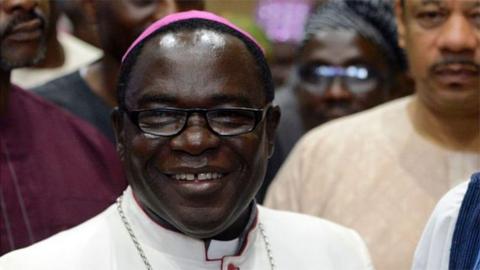Bishop Matthew Kukah highlights the prosecution of Christians in Nigeria to the US Congress in Washington

The Archbishop of Catholic Diocese of Sokoto, Matthew Kukah has expressed fears that the Nigerian government under President Muhammadu Buhari is handling issues which concerns religious violence poorly.
Bishop Kukah said this during a virtual presentation to the US Congress in Washington on the prosecution of Christians in Nigeria by armed extremist group in the Northern parts of the country.
The clergy in his testimony before the Congress claim that attacks on Christians in Nigeria has been happening for many years but has seen a sharp rise in the last 10 years.
Bishop Kukah also claim that the extremists also target schools in Northern Nigeria especially Christian schools and they do “indoctrinate the children, they end up converting the children to wives, cooks, spies, sexual slaves and so on.”
According to Bishop Kukah, “Last year 2020 scores of our Priests in the North were killed, they kidnapped our children and forcefully converted them to Islam. We have issued several statements and called the attention of government to our plight but you see, we have weak institutions.”
Di Bishop of Sokoto Diocese also complained about Nigeria’s leadership structure saying, “for the first time in Nigeria (since the return to democracy in 1999) the top three officials; the President, Senate President and Speaker are all Muslims. This has never happened before.”
The Tom Lantos Human Rights Commission is examining the state of religious freedom around the world with testimonies from Christians who are under attacks in Nigeria and Muslim minority who suffer persecution in Kazakhstan.
Bishop Matthew Hassan Kukah profile
Bishop Kukah was born in Zangon Kataf local government of Kaduna state, in northern Nigeria on August 31st of 1952, according to his profile on the catholic diocese website.
He attended St Fidelis primary school, Zagom, before he moved to St Joseph minor seminary in Zaria and St Augustine major seminary in Jos, Plateau state (north-central Nigeria) where he studied philosophy and theology.
Kukah become catholic priest in 1976 and immediately after, he obtained a diploma from University of Ibadan in religious studies and that same year he also got a degree from pontifical urban university in Rome, Italy.
The bishop also received a Masters Degree in peace studies from Bradford University in the United Kingdom in 1980 and in 1990 he completed his PhD from university of London school of Oriental and African studies.
Bishop Kukah shoot into national limelight when he served as secretary to Nigeria Commission on Human Rights violation, popularly known as Justice Oputa panel in 2001.
In 2005 he also served as secretary during the National Political Reform conference and also led the reconciliatory talks between Shell and the Ogoni people in the oil producing South South Nigeria.
Between 2007 and 2009, he was also part of the committee on electoral reform setup by then president Umaru Musa Yar’adua

Great article, I really had a great time reading it. Your way of writing is very engaging and the ideas are very relevant. Keep up the great work!